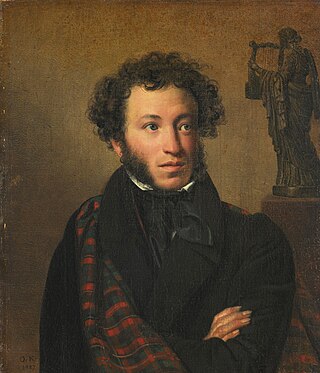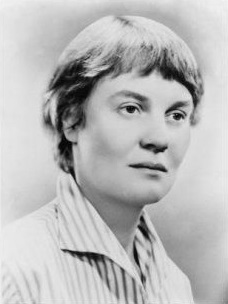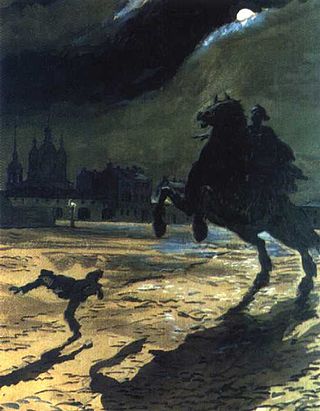Related Research Articles

Alexander Sergeyevich Pushkin was a Russian poet, playwright, and novelist of the Romantic era. He is considered by many to be the greatest Russian poet and the founder of modern Russian literature.

Dame Jean Iris Murdoch was an Irish and British novelist and philosopher. Murdoch is best known for her novels about good and evil, sexual relationships, morality, and the power of the unconscious. Her first published novel, Under the Net (1954), was selected in 1998 as one of Modern Library's 100 best English-language novels of the 20th century. Her 1978 novel The Sea, the Sea won the Booker Prize. In 1987, she was made a Dame by Queen Elizabeth II for services to literature. In 2008, The Times ranked Murdoch twelfth on a list of "The 50 greatest British writers since 1945".
John Oliver Bayley, CBE, FBA, FRSL was a British academic, literary critic and writer. He was the Warton Professor of English at the University of Oxford from 1974 to 1992. His first marriage was to the novelist and philosopher Iris Murdoch.

Russian literature refers to the literature of Russia and its émigrés and to Russian-language literature. The roots of Russian literature can be traced to the Middle Ages, when epics and chronicles in Old East Slavic were composed. By the Age of Enlightenment, literature had grown in importance, and from the early 1830s, Russian literature underwent an astounding golden age in poetry, prose and drama. Romanticism permitted a flowering of poetic talent: Vasily Zhukovsky and later his protégé Alexander Pushkin came to the fore. Prose was flourishing as well. Mikhail Lermontov was one of the most important poets and novelists. The first great Russian novelist was Nikolai Gogol. Then came Ivan Turgenev, who mastered both short stories and novels. Fyodor Dostoevsky and Leo Tolstoy soon became internationally renowned. Other important figures of Russian realism were Ivan Goncharov, Mikhail Saltykov-Shchedrin and Nikolai Leskov. In the second half of the century Anton Chekhov excelled in short stories and became a leading dramatist. The beginning of the 20th century ranks as the Silver Age of Russian poetry. The poets most often associated with the "Silver Age" are Konstantin Balmont, Valery Bryusov, Alexander Blok, Anna Akhmatova, Nikolay Gumilyov, Sergei Yesenin, Vladimir Mayakovsky, and Marina Tsvetaeva. This era produced some first-rate novelists and short-story writers, such as Aleksandr Kuprin, Nobel Prize winner Ivan Bunin, Leonid Andreyev, Fyodor Sologub, Yevgeny Zamyatin, Alexander Belyaev, Andrei Bely and Maxim Gorky.

Julian Patrick Barnes is an English writer. He won the Man Booker Prize in 2011 with The Sense of an Ending, having been shortlisted three times previously with Flaubert's Parrot, England, England, and Arthur & George. Barnes has also written crime fiction under the pseudonym Dan Kavanagh. In addition to novels, Barnes has published collections of essays and short stories.
Genre fiction, also known as formula fiction or popular fiction, is a term used in the book-trade for fictional works written with the intent of fitting into a specific literary genre in order to appeal to readers and fans already familiar with that genre.
British literature is literature from the United Kingdom of Great Britain and Northern Ireland, the Isle of Man, and the Channel Islands. This article covers British literature in the English language. Anglo-Saxon literature is included, and there is some discussion of Latin and Anglo-Norman literature, where literature in these languages relate to the early development of the English language and literature. There is also some brief discussion of major figures who wrote in Scots, but the main discussion is in the various Scottish literature articles.

Father Brown is a fictional Roman Catholic priest and amateur detective. He features in 53 short stories by English author G. K. Chesterton, published between 1910 and 1936. Father Brown solves mysteries and crimes using his intuition and keen understanding of human nature. Chesterton loosely based him on the Rt Rev. Msgr John O'Connor (1870–1952), a parish priest in Bradford, who was involved in Chesterton's conversion to Catholicism in 1922. Since 2013, the character is portrayed by Mark Williams in the ongoing BBC Television Series Father Brown.
Dr. Richard Austin Freeman was a British writer of detective stories, mostly featuring the medico-legal forensic investigator Dr. Thorndyke. He invented the inverted detective story. This invention has been described as Freeman's most noticeable contribution to detective fiction. Freeman used some of his early experiences as a colonial surgeon in his novels. Many of the Dr. Thorndyke stories involve genuine, but sometimes arcane, points of scientific knowledge, from areas such as tropical medicine, metallurgy and toxicology.

Seichō Matsumoto was a Japanese writer, credited with popularizing detective fiction in Japan.
Donald Michael Thomas was a British poet, translator, novelist, editor, biographer and playwright. His work has been translated into 30 languages.

Leonard Alfred George Strong was a popular English novelist, critic, historian, and poet, and published under the name L. A. G. Strong. He served as a director of the publishers Methuen Ltd. from 1938 to 1958.
John Barlow is an English writer. He was born in the Yorkshire village of Gomersal, near Leeds. He studied English Literature at the University of Cambridge and has a PhD in Applied linguistics from the University of Hull. He works as a novelist, food writer and translator, and lives in the Galician city of A Coruña (Spain).
Oliver Elton, FBA was an English literary scholar whose works include A Survey of English Literature (1730–1880) in six volumes, criticism, biography, and translations from several languages including Icelandic and Russian. He was King Alfred Professor of English at Liverpool University. He also helped set up the Department of English at the University of the Punjab, Lahore, Pakistan.
Simon Mason is a British author of juvenile and adult fiction.

The Bronze Horseman: A Petersburg Tale is a narrative poem written by Alexander Pushkin in 1833 about the equestrian statue of Peter the Great in Saint Petersburg and the great flood of 1824. While the poem was written in 1833, it was not published, in its entirety, until after his death as his work was under censorship due to the political nature of his other writings. Widely considered to be Pushkin's most successful narrative poem, The Bronze Horseman has had a lasting impact on Russian literature. The Pushkin critic A. D. P. Briggs praises the poem "as the best in the Russian language, and even the best poem written anywhere in the nineteenth century". It is considered one of the most influential works in Russian literature, and is one of the reasons Pushkin is often called the "founder of modern Russian literature".

Joe Andrew is a British academic whose main research interests are 19th-century Russian literature, feminist approaches to literature, and women writers.
English literature is literature written in the English language from the United Kingdom, its Crown Dependencies and Overseas Territories, the Republic of Ireland, the United States, and the countries of the former British Empire. The English language has developed over the course of more than 1,400 years. The earliest forms of English, a set of Anglo-Frisian dialects brought to Great Britain by Anglo-Saxon invaders in the fifth century, are called Old English. Beowulf is the most famous work in Old English, and has achieved national epic status in England, despite being set in Scandinavia. However, following the Norman conquest of England in 1066, the written form of the Anglo-Saxon language became less common. Under the influence of the new aristocracy, French became the standard language of courts, parliament, and polite society. The English spoken after the Normans came is known as Middle English. This form of English lasted until the 1470s, when the Chancery Standard, a London-based form of English, became widespread. Geoffrey Chaucer, author of The Canterbury Tales, was a significant figure in the development of the legitimacy of vernacular Middle English at a time when the dominant literary languages in England were still French and Latin. The invention of the printing press by Johannes Gutenberg in 1439 also helped to standardise the language, as did the King James Bible (1611), and the Great Vowel Shift.
References
- 1 2 3 "T. J. Binyon" . The Independent . 13 October 2004. Archived from the original on 26 May 2022.
- ↑ "Obituary: Tim Binyon". The Guardian . 19 October 2004. Archived from the original on 17 March 2023.
- ↑ The Daily Telegraph
- 1 2 3 Elliott, Geoffrey; Shukman, Harold (2003). Secret Classrooms: A Memoir of the Cold War. St Ermin's. ISBN 9781903608135.
- ↑ Bayley, John (September 2002). "As He Lay Dying, He Called for Cloudberries". Literary Review .